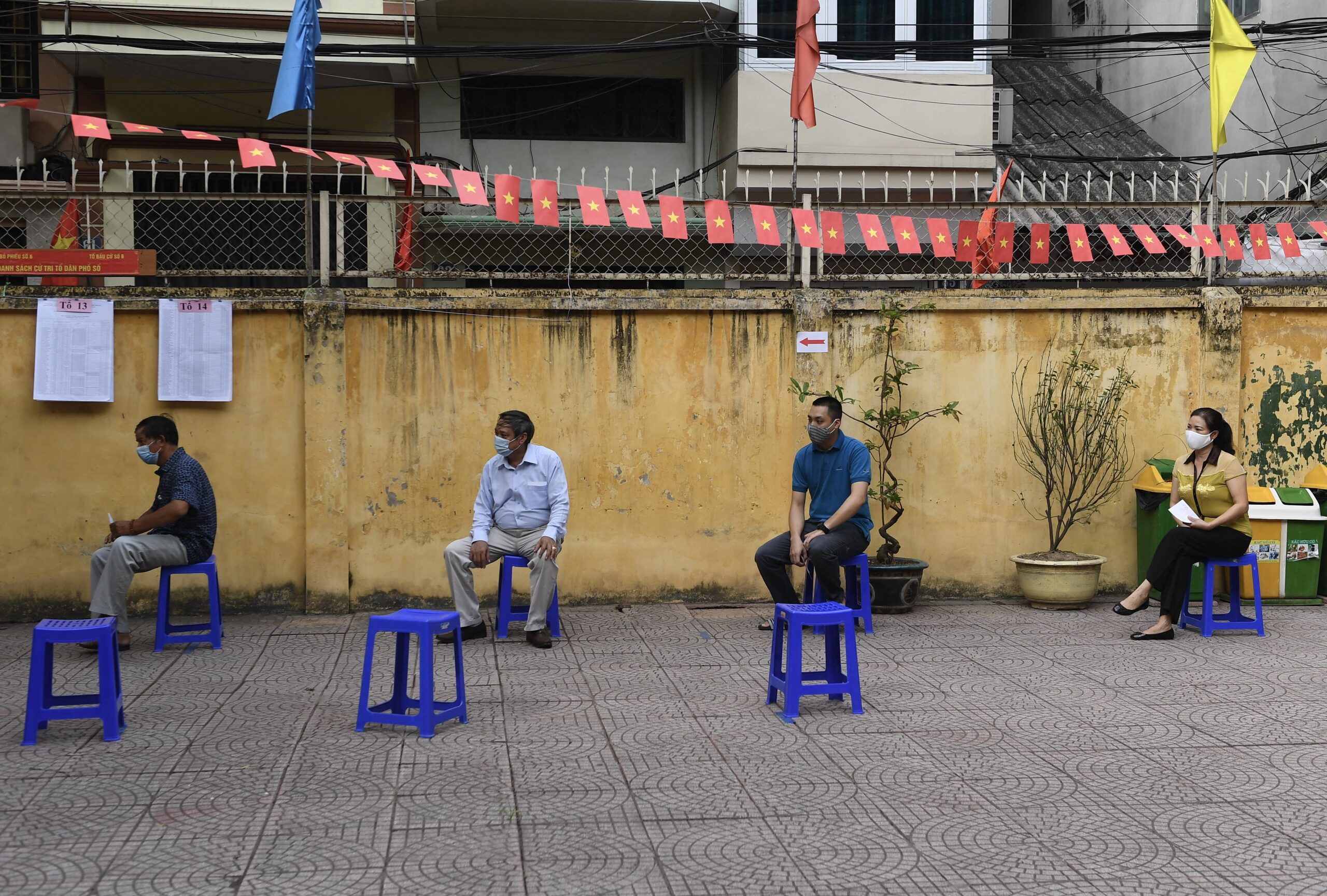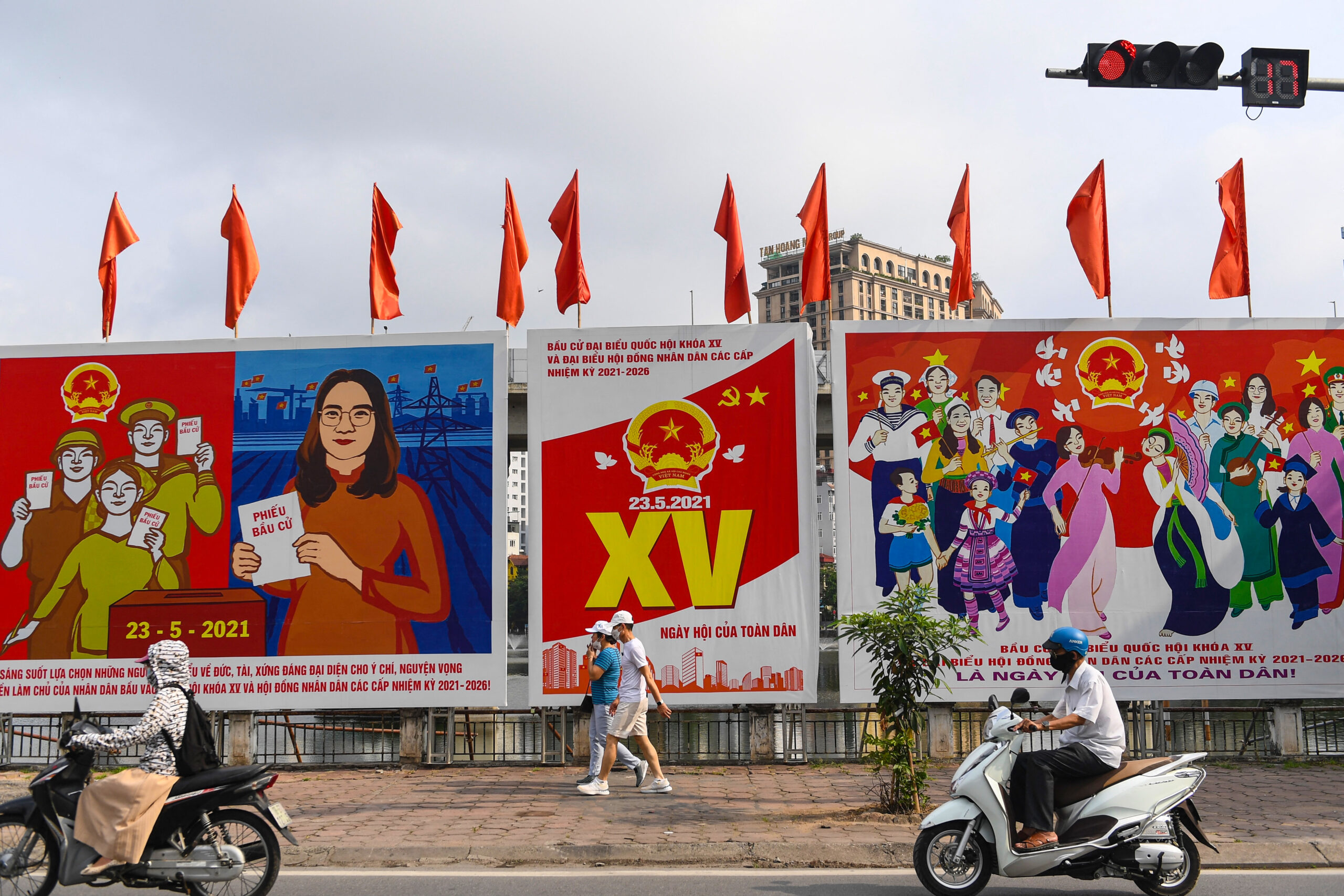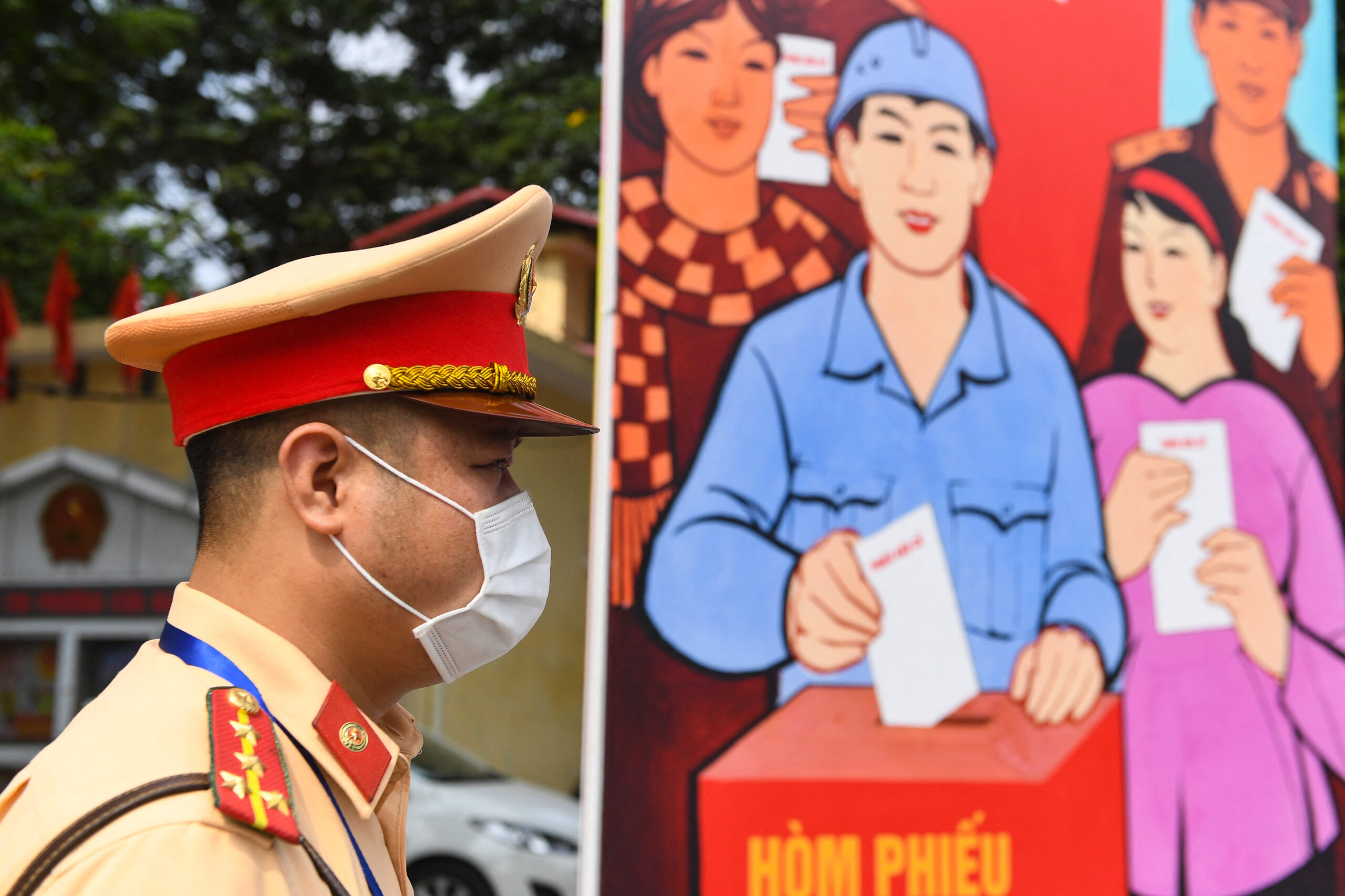Trinh and her husband went to his family’s house in Hanoi’s Thanh Xuân district, where they lived before moving to a new apartment. Her in-laws had a tradition of gathering all the children and grandchildren for Sunday lunch.
On the morning of 23 May, Trinh’s sister-in-law, Cúc, went to a polling station to vote in the 15th tenured National Assembly and People’s Council election. The winning candidates would serve terms from 2021 to 2026. She carried six voting cards, known as “thẻ cử tri,” to be certified by the community leader on site for the six adults in the family.
The head of her neighbourhood gave 18 anonymous ballots to Cúc. Red ballots displayed the nominees for National Assembly deputies, blue ballots named those seeking Hanoi People’s Council seats and white ballots listed candidates for the People’s Council in her district.
Cúc paid little attention to the ballots. Nor did she glance at the list of nominees and their paper resumés glued to a bulletin board. She quickly crossed out the names of the last two people on each ballot and put them into the boxes.
“I voted as quickly as I could so as not to catch the Covid,” said Cúc, who barely remembered the names of nominees and returned home with six red-stamped cards verifying all the family members had voted.
Cúc was one of 69 million voters who contributed to what state-owned media described as successful elections in a democratic Vietnam. The Legislative Election Day, called the Festival of the People, took place as the communist-ruled country was on high alert amid a new Covid-19 wave.
A few days earlier, the authorities warned residents in Hanoi, the capital city, against unnecessary travel. Yet they also urged voters to turn up at polling stations. Many opted for proxy voting, bầu hộ in Vietnamese, having little knowledge of the candidates and little faith in the election’s authenticity.
Trinh and Cúc, along with the other sources interviewed for this article, asked for their full names to be withheld to protect themselves against possible repercussions.

On the same day Cúc made her trip to the polling station, Trinh received a call from the community leader of her new residence in Hanoi’s Long Biên district. The caller said she and her husband had not voted.
Trinh was surprised because she had been automatically registered to vote at her in-laws’ address in Thanh Xuân district, which was listed as her permanent household.
“I explained to him that me and my husband had voted in the morning and our voting cards were even stamped,” Trinh said. “But he tactfully urged me to come and vote again, since another pair of voting cards were still there.”
Trinh rarely attended community gatherings and barely knew her community leader, one of the group of bureaucrats who only contacted her when they needed to collect fees and funds from her family.
She arrived at the polling station around 5pm. Security guards hinted that local leaders had created the best possible conditions for citizens to exercise their rights, so they should be cooperative. The electoral process was “protected” by the Ministry of Public Security, they claimed.
“They do not care that I had two ballots and voted twice. All that they care about is that I cast my ballot in the area of their management, so that they would be able to report to superiors that their duties were fulfilled,” said Trinh, who admitted to taking only seconds to cast the ballots for herself and her husband without using separate voting booths, as instructed.
“Nobody would bother to spy on whom I voted for. I didn’t even cross any name and just put all the ballots into the boxes,” Trinh said.
In a country where state-controlled media outlets glorify electoral success by sheer voter turnout of 99%, the practice of double voting shows the corruption behind the facade of an effective democracy.
Though she would not have not been punished if she refused to vote twice, Trinh said she believes there may have been negative consequences for her family’s relationship with local authorities.
“Had the community leader not pushed me, I would not have gone. It would not make any difference,” said the 38 year old, whose visit to the second polling station was the first time she cast a ballot by herself. “I understood that they needed numbers, but would not expect them to go too far as to push me to vote twice.”
Community leaders have their own ulterior motives, fuelled by the promise of rewards for hollow achievements such as encouraging voter registration, Trinh said.
Indoctrination is another method the neighbourhood officials employ to inflate voter numbers. Trinh recalled working at the culture and information section of a district People’s Committee with responsibility for promoting the 2011 election. She had to listen to an official election song eight hours per day for weeks.
“It was boring and stupid. The propaganda aimed to increase voter turnout,” Trinh said. “But everybody knew that even more votes would not change the game. Everything was pre-structured.”
There was a slogan commonly used at the polling station: ‘Voting is the right and duty of every Vietnamese citizen.’ But the lack of publicly available background information on the candidates hindered voters from making well-informed decisions.
Trinh quit the civil service job after refusing to become a Communist Party member, which was a prerequisite for promotion at a state agency. She remembered hearing rumours about which candidates would be hand-picked before the elections, fuelling her suspicions that each voter was just an actor in a play orchestrated by government leaders.

Hoàng, who was eligible to vote for the first time this year, did not recall any candidate’s name.
“I read every candidate’s profile. Each was not longer than one page. I Googled them to find more info, but found nothing,” the 22-year-old graduate said.
Candidate profiles include a photograph and brief information about their education, party membership and professional experience.
“They are the same to me,” Hoàng said. “There is no policy proposal at all, so I am clueless who would make a better delegate.”
Vietnam voters eliminate the names on a ballot they do not wish to elect. Like Trinh, Hoàng said he did not cross off any name, effectively casting a vote for all the candidates: “I do not know any of them anyway. It would be unfair to cross out the names of those who might have deserved a seat.”
Phượng, a Hanoi-based professional, was visiting her hometown in Nam Định province on election weekend. She intended to vote, but three days before the election her parents were ordered to quarantine after contact with Covid-19 patients. The family, including Phượng and her younger brother, could not leave home.
Community leaders went to the house with a ballot box. Phượng voted on behalf of her family.
“They only provided the ballots and no information about the candidates. I did not have the chance to see their faces, so I voted for names that sound beautiful,” Phượng said. “It was hot outside, and I did not want to keep them waiting.”
While the state highlights the need for accessible and inclusive elections, some residents are not invited to join the Festival of the People.
Lâm lived in the Hai Bà Trưng district beginning in 2008 after serving a prison sentence for drug smuggling. He said community leaders never pushed him to vote or delivered ballots to his door.
They only provided the ballots and no information about the candidates. I did not have the chance to see their faces, so I voted for names that sound beautiful
“I saw [the community leader] touring the neighbourhood and using a loudspeaker on that day to push people to vote. He saw me in front of my alley’s gate, but said nothing,” the ex-prisoner said. “Perhaps local leaders don’t want to bother me at all, as I am on a blacklist.”
Hồng, the area community leader, refused to comment on whether the criminal record made Lâm ineligible to receive voting cards.
There are four groups ineligible to vote under Article 30 of the 2015 Vietnamese Law on Election for the National Assembly and People’s Councils. People who have been deprived of their voting rights by a court judgement, prisoners awaiting execution, people serving an unsuspended judicial sentence and those who have lost the capacity for civil acts. The fourth designation refers to people suffering from mental illness deemed incapable of understanding or controlling their civil activity.
In reality, official voters are simply those who receive voting cards from community leaders.
There were more than 4,000 polling stations across Hanoi for approximately 5 million registered voters this year. While the voting outlets are widespread, they rely on apathetic volunteers working without sufficient resources.

Giang, a 22-year-old member of the Youth Union of the Communist Party, said she was mobilised to “serve the elections” at a polling station in the Hai Bà Trưng district. She was at a loss about the role of the National Assembly, the highest representative body of the Vietnamese people.
“I hardly care about what they do. The National Assembly and People’s Councils do not mean anything to me,” Giang said.
A former National Assembly deputy who was quoted in a book about Vietnam’s legislature said ordinary citizens are “not allowed to care” about politics.
Volunteers are subject to strict regimes, along with health and safety risks. Giang, who said the allowance for her time was insufficient, had to arrive by 5:30am to take part in logistical preparations. She was then tasked with instructing citizens on how to cast their ballots. When district leaders arrived to vote and pose for photos, she had to make ordinary voters line up and wait.
“Those serving at the polling stations were the most vulnerable people that day, since they were in contact with many people,” Giang said. “None of us had been vaccinated, so we were a bit worried.”
Vietnam, a country of almost 100 million people, did not begin its vaccination campaign until March. Before May, the country remained the least vaccinated nation in Southeast Asia with 2.9 million doses received and 1 million administered.
“It was almost impossible to maintain a two-metre distance, as required. The polling station was small and there were too many voters, volunteers and staff members,” Giang said.
Tuấn, a Hai Bà Trưng district community leader, said he had little idea of how the ballots were counted, adding that there was a special, top-down team in charge. His job at the polling station was only to confirm that people claiming to be from his neighbourhood were “eligible voters,” meaning they were citizens of his ward.
Tuấn was told to keep a watchful eye out for suspicious strangers: “No foreign-looking people were allowed to be present at voting venues.”
Vietnam ranked 121 out of the 162 countries in the 2020 Human Freedom Index rating personal, economic and human freedom. Only one political organisation, the Communist Party founded in 1930, carries legal status, while other entities operate on the sly or overseas.
Attempts to question the party’s leadership or call for plural political representation are considered anti-state propaganda, punishable by up to 20 years imprisonment under Article 117 of the penal code. An October 2020 decree signed by then-prime minister Nguyễn Xuân Phúc, who is now Vietnam’s president, stipulates fines and other penalties for those who publicise information deemed harmful to the Communist Party.
A provincial court last month sentenced an aquaculture farmer to seven years in prison and three years of house arrest for posting poems and images on Facebook that authorities said were meant to “distort, slander and defame the leadership of the (Vietnam Communist) party, the state and leader Ho Chi Minh,” Reuters reported.
Whoever was elected would not make any difference
Five months earlier, the government had announced the results of the election held in May. Polling station worker Giang, first-time voter Hoàng and Trinh, the former civil servant who cast two ballots, each said they paid little attention.
“Whoever was elected would not make any difference,” Giang said.
The Vietnamese unicameral body is largely powerless. Only 40% of deputies to the National Assembly work in their positions on a full-time basis. Like the Communist Party, the National Assembly employs a principle of consensus. Legal statutes and other official business are normally approved without discussion by members clapping their hands.
Using this audience guesstimate method, the National Assembly also selects its chairperson, the Communist Party general secretary, the prime minister and the president, known as the four pillars of power in Vietnam.
The revised law on the Organisation of the National Assembly, which was passed in 2019 and came into effect in January, gives individual legislators the power to propose bills, but none has yet exercised the right.
“It will be a long time before we have a real National Assembly,” Trinh said. “If that is the case, I might not be living in this world anymore.”
Tabrez Vardah is a freelance writer based in Vietnam. This article was produced under the Asian Network for Free Elections (ANFREL) Southeast Asia Media Fellowship on Election Reporting.


